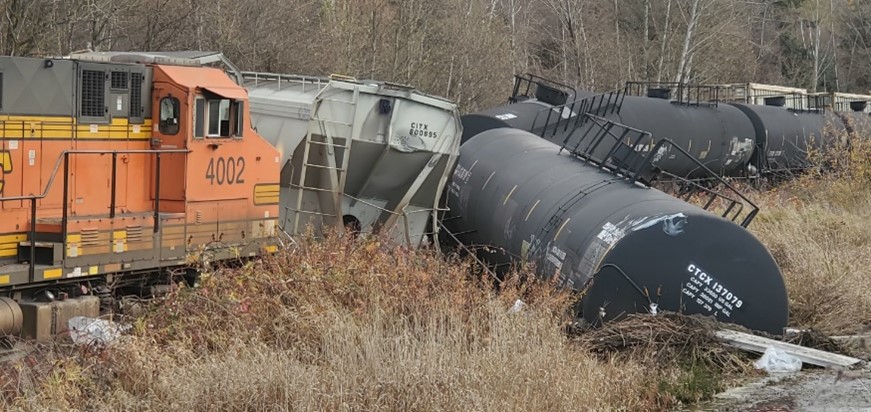Train collision and derailment
Burlington Northern and Santa Fe Railway
Mile 133.5, New Westminster Subdivision
Delta, British Columbia
The occurrence
On 19 November 2023, a Burlington Northern and Santa Fe Railway (BNSF) freight train was proceeding northbound on the main track of the New Westminster Subdivision in Delta, British Columbia, at Mile 133.5, when it passed a stop signal and struck the side of a southbound mixed merchandise BNSF freight train.
As a result, 2 intermodal cars on the southbound train derailed on their side. Both lead locomotives and 5 cars on the northbound train also derailed. Three of these cars, which contained dangerous goods, derailed in an upright or leaning position. A fuel tank on the lead locomotive was ruptured, spilling an estimated 8000 litres of diesel fuel.
No injuries were reported. TSB Western Region investigators have been deployed and are investigating.
Media materials
Deployment notice
TSB deploys an investigator following a train collision and derailment near South Surrey, British Columbia
Richmond, British Columbia, 19 November 2023 — The Transportation Safety Board of Canada (TSB) is deploying an investigator following a train collision and derailment that occurred on the New Westminster Subdivision, British Columbia. The TSB will gather information and assess the occurrence.
Investigation information
Download high-resolution photos from the TSB Flickr page.
Class of investigation
This is a class 3 investigation. These investigations analyze a small number of safety issues, and may result in recommendations. Class 3 investigations are generally completed within 450 days. For more information, see the Policy on Occurrence Classification.
TSB investigation process
There are 3 phases to a TSB investigation
- Field phase: a team of investigators examines the occurrence site and wreckage, interviews witnesses and collects pertinent information.
- Examination and analysis phase: the TSB reviews pertinent records, tests components of the wreckage in the lab, determines the sequence of events and identifies safety deficiencies. When safety deficiencies are suspected or confirmed, the TSB advises the appropriate authority without waiting until publication of the final report.
- Report phase: a confidential draft report is approved by the Board and sent to persons and corporations who are directly concerned by the report. They then have the opportunity to dispute or correct information they believe to be incorrect. The Board considers all representations before approving the final report, which is subsequently released to the public.
For more information, see our Investigation process page.
The TSB is an independent agency that investigates air, marine, pipeline, and rail transportation occurrences. Its sole aim is the advancement of transportation safety. It is not the function of the Board to assign fault or determine civil or criminal liability.


